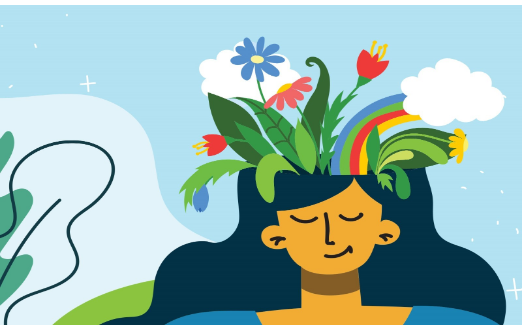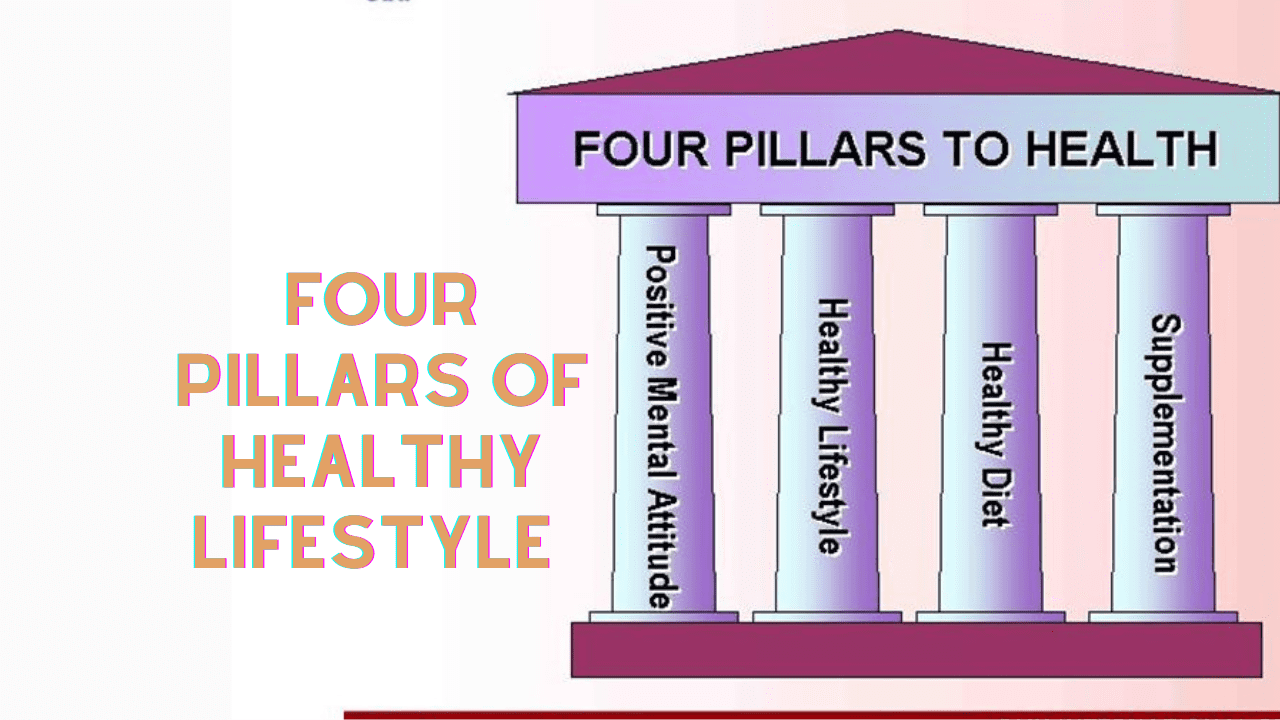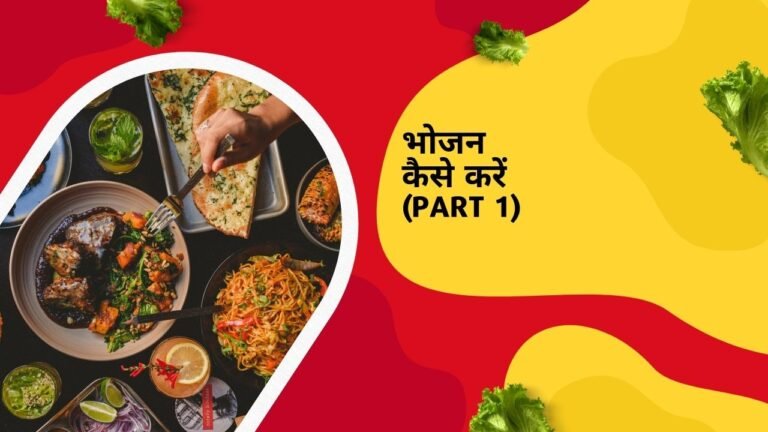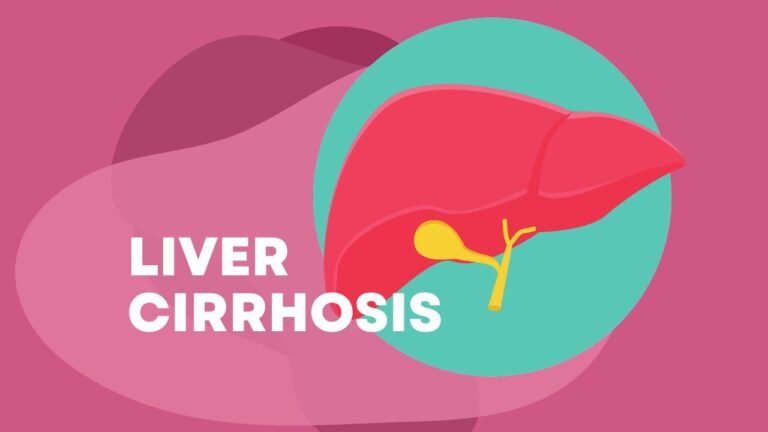Four Pillars of a Healthy Lifestyle
Four Pillars of a Healthy Lifestyle
A Healthy Lifestyle can also be defined as a disease-free lifestyle. In this article, we will discover the path to a healthy lifestyle and the four pillars that can lead us in the right direction. People often tend to think that we need to make major alterations in our daily life, diet and eating patterns to get fruitful results. The truth is it can be done through a small switch in our routine habits to bring an impactful positive change in our lives.

The Best Routine of a Healthy Lifestyle involves these four pillars:
- FOOD
- EXERCISE
- RELAXATION
- STRESS
Paying attention to these four aspects can lead to drastic affirmative results in your health condition.
- FOOD:
Food is a vast topic which is dynamic as it varies from person to person, region to seasons to cultural and traditional practices and values. The occupation and living conditions may also affect a person’s mental, spiritual and physical health. The best food for you is the one that is seasonal and is available and is a popular staple food in your region. The season and region are crucial when it comes to food. The consumption of these food types is a must. Examples, fruits as per their seasons and rice, wheat, etc.
When we talk about “diet” a lot of misconceptions arise regarding the term. We conjecture that we must impose major restrictions on what goes in our body. Which is true to some extent but diet is not a restriction, it’s the collective result of your time schedule of eating, the quantity and quality of food along with some other factors. We should follow a balanced diet instead of a restricted one.
There are certain things to keep in mind such as:
- Following a positive attitude towards eating. Believing that it’s possible to have healthy food without thinking of it as a way of punishing yourself.
- All the digestive juices secreted in our body need to be maintained well. It is necessary to pay attention to what your body is telling you.
- The suitability of a particular food varies from person to person. Some may be allergic to certain foods. Ex, peanut allergies, pineapple allergy, etc. We need to take care of this while preparing a diet.
- It is crucial to follow a diet that is designed according to the nature and needs of your body.
- Having an early dinner around the time of sunset is ideal. It gives your body enough time to digest everything before you sleep.
- It is also necessary to have a fixed time schedule for eating your meals.
- Since it takes 4-5 hours to digest a meal completely, sufficient time gaps between meals are highly recommended. (There are a few exceptions to people that are gaining weight, etc.)
Most of the trends or rumors followed by the market are myths. Different grains activate the secretion of different digestive juices and are digested in different patterns.
The concept of multigrain should be completely avoided. It can lead to indigestion and the issues related to it. Having a single type of grain in a single seating is the proper method of healthy eating.
BREAKFAST:
As the term suggests, you’re breaking a fasting period of 7 or more hours.
- The food you consume early in the morning therefore should have pre- digestive properties
- It should be rich in fiber
- It should be alkaline in nature.
- Fresh seasonal fruits are the best alternative for breakfast.
- Smoothies, curd or yoghurt, vegetable juices, coconut water and fruit juices are some other classic options you can go for.
LUNCH:
- Have a salad before lunch, it prepares your digestive system and helps prevent overeating.
- The ideal lunch time is between or around 12:00pm to 1:00pm.
- Sleeping right after eating a whole meal or having a lot of water before or after eating should be strictly avoided. It disrupts the digestive process.
- At least for 60-90 minutes (about 1 and a half hours) after or before consumption of food, you should avoid drinking water or eating.
DINNER:
- The ideal time to have your dinner is between or around 6:30pm to 7:30 pm.
- Try to have a light dinner instead of eating something heavy that may be difficult to digest.
- You can have green tea, juices and fruits as snacks instead of junk eating or munching unhealthy or oily foodstuffs.
- Have a soup before dinner without “tadka” or excessive spices.
- Avoid having chapatti which has a high number of calories and takes a while to digest.
- Have millets, khichadi, etc. as substitutes for other heavy, hard to digest food.
Here are some other guidelines to help you build a foolproof system for eating right:
- Maintain proper food and water intake.
- Take water only as per your requirement. Your occupation, whether it be a field job or a desk job, influences the amount of water your body may need.
- Make sure not to forget to enjoy your food.
- Have a cheat meal if you want once a week but don’t forget to follow your time schedule.
- Fast or have a grain free diet once a week to balance your health.
- Have the food recommended as per your traditional values.
- Having ghee or oil (in a controlled proportion) helps maintain lubricity in joints.
- Avoid processed or preserved food, coffee, etc. that hampers your health.
There are ingredients available easily in your homes and are highly beneficial for your health:
- Hing (asafetida)
- Ajwain (carom seeds)
- Haldi or turmeric
- Black salt
- Jeera (cumin)
- Black pepper
- Ginger
Food is the best medicine. It has a huge influence on your body and its condition. A little attention in the right direction will help you improve your health a lot more.
EXERCISE:
Exercise is perceived as something people put a lot of effort into like working hard and sweating. And while that is necessary, exercise has many forms. It can be anything from dancing to hitting the gym! Exercising even 20-30 mins a day can help maintain a healthy lifestyle.
Breathing exercises like pranayama are essentially the most beneficial. The breathing varies in different animals. Some animals that breathe less frequently live longer, ex, turtles. Pranayama can increase life span, increase oxygen level in the body, rejuvenate the body and fight aging.
Exercise has multiple benefits:
- It promotes body movement
- Strengthens muscles
- It causes sweating which releases toxins from the body and leads to the process of detoxification.
- It helps overcome hormonal imbalance
- Laughing is another best exercise to release stress and build a healthy mind.
- Trying pranayama only for 60-90 days (about 3 months) will show you drastic results.
- It increases your alertness, focus and concentration.
- You build quick decision-making skills and a sharp memory.
- It has multiple benefits in all fields of life, no matter what you do for a living.
MENTAL HEALTH OR RELAXATION:
Often devalued, mental health or relaxation is as important as any other pillar to a healthy lifestyle. Today, when the world is bombarded with screens, and heavy information pouring in, the working population experiences the most stress and exhaustion. Even students struggle with issues like depression, anxiety and other mental health issues due to cutthroat competition and the race of life.
Especially for working women who need to juggle between work and their homes, it takes a huge toll on their health.

You must make sure you make your sleep a priority. At least 6-8 hours of sleep is required by the body and is therefore mandatory. When you’re sleeping or relaxing it:
- Improves your metabolic activity and boosts overall metabolism.
- The body is continuously working 24/7, relaxing gives your organs and functional systems like digestive system and central nervous system time to recharge.
- Brain activity and efficiency is greatly enhanced.
- You feel refreshed and energetic.
- Sound sleep or the quality of your sleep is essential.
- It acts like therapy for your body.
- The ladies that are about to hit menopause benefit from this too.
- It assists in dealing with depression, anxiety and other mental health issues.
- The IQ level of a person is said to be increased.
- It is a historical tradition which holds massive significance.
The things we often take for granted are the most important ones.
STRESS:
Stress has become a major part of our lives. We can’t live without it. Relaxation without some kind of stress can lead to laziness. It is often perceived with a negative emotion, but it can be used as a tool to improve productivity.
Stress has been proven to increase creativity levels, mindfulness and consciousness. If used positively, stress can be a major boon in one’s life. Stress levels vary from person to person. It is crucial to take frequent and small breaks whenever you can.
It is necessary to understand that we shouldn’t try to make life a rat race and try to achieve satisfaction in the things you love. Knowledge regarding mental health is something that should be made common.
In today’s material world, it is important to understand that money can be made back but health is something that we cannot afford to damage. It is difficult to recover your mental health. Make health a priority. “Precaution is better than cure”.
The “me time” term that people have been stressing is relevant. Take a step back, unwind, invest in your hobbies and spend time with yourself. This will help you balance your stress, dilute your negative thoughts and affect your overall happiness levels. Be a little selfish! Live your life! Because when you’re happy you make the people around you happy.








